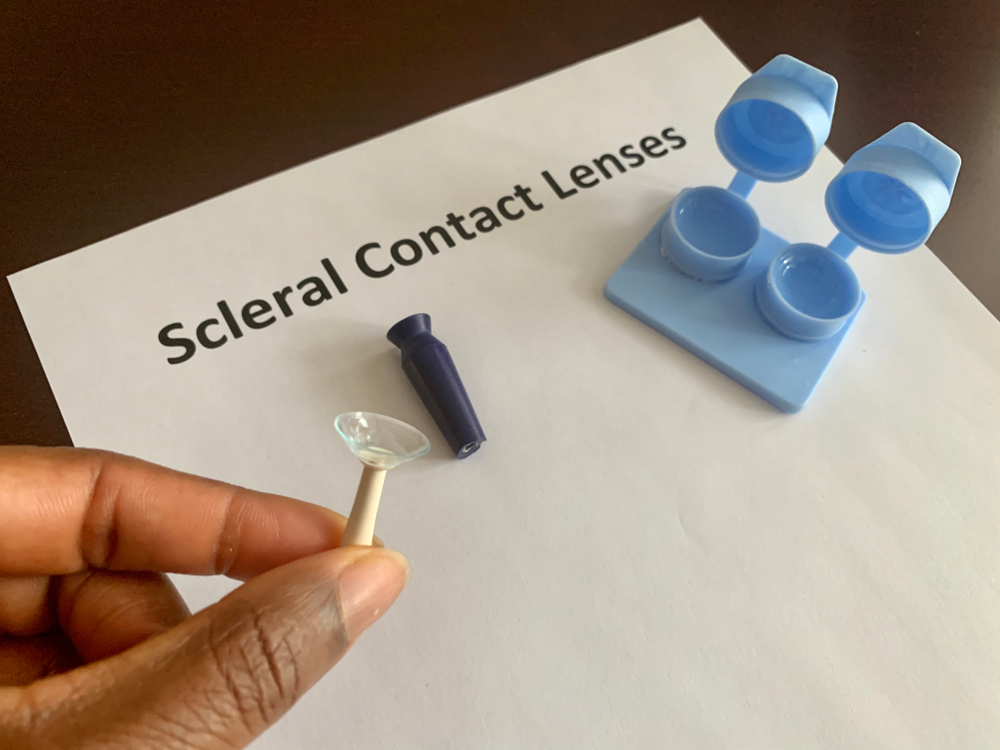
For individuals seeking clear, comfortable vision correction, contact lenses are a popular and effective solution. However, not all contact lenses are the same. Among the different types available, scleral lenses offer unique benefits, particularly for individuals with specific eye conditions or those who struggle with standard contact lenses.
What Are Scleral Lenses?
Scleral lenses are large-diameter, rigid gas-permeable lenses that cover not just the cornea (the clear front surface of the eye) but extend over the sclera, the white part of the eye. These lenses create a tear-filled reservoir between the lens and the cornea, providing exceptional comfort and hydration.
Key Differences Between Scleral Lenses and Regular Contact Lenses
1. Size and Fit
Regular Contact Lenses: Typically, soft or rigid lenses are designed to sit directly on the cornea. These lenses are smaller in diameter, generally ranging from 8-14 millimeters.
Scleral Lenses: With a diameter of 14-20 millimeters, scleral lenses vault over the cornea and rest on the sclera. This design minimizes direct contact with the sensitive corneal tissue.
2. Comfort Level
Regular Contact Lenses: While comfortable for many, standard lenses can cause irritation for individuals with dry eye, keratoconus, or irregular corneas.
Scleral Lenses: The fluid reservoir beneath scleral lenses keeps the eye hydrated, providing relief for those with dry eye syndrome or other corneal conditions. The lack of direct corneal contact also reduces irritation.
3. Purpose and Use
Regular Contact Lenses: Best suited for correcting common refractive errors like nearsightedness, farsightedness, and astigmatism in individuals with normal corneal shapes.
Scleral Lenses: Specifically designed for individuals with irregular corneas, advanced keratoconus, severe dry eye, post-surgical complications, or conditions such as Stevens-Johnson syndrome or Sjögren’s syndrome.
4. Durability and Maintenance
Regular Contact Lenses: Soft lenses need daily or monthly replacements depending on the type, while rigid lenses are longer-lasting but require careful handling.
Scleral Lenses: Made from durable gas-permeable materials, scleral lenses can last up to a year with proper care. They require cleaning and storage in a specialized solution to maintain their quality.
5. Visual Clarity
Regular Contact Lenses: Effective for most users, but may not provide optimal clarity for those with irregular corneas or advanced astigmatism.
Scleral Lenses: Their custom design ensures a perfect fit, delivering sharper vision for individuals whose conditions make standard lenses insufficient.
Who Can Benefit From Scleral Lenses?
Scleral lenses are a game-changer for people with:
Keratoconus or corneal ectasia
Severe dry eye disease
Post-surgical complications from LASIK or corneal transplants
High levels of astigmatism or irregular corneal shapes
Sensitivities that make soft lenses uncomfortable
Why Choose Avant Garde Vision Center?
Scleral lenses offer a remarkable alternative for those who cannot achieve comfort or clear vision with regular contact lenses. We specialize in personalized eye care solutions. Dr. Zabarko conducts comprehensive eye exams and uses advanced technology to determine the best lens option for your unique needs. If you’re considering scleral lenses, we’ll guide you through the fitting process to ensure maximum comfort and clarity.
To discover whether scleral lenses are right for you, contact Avant Garde Vision Center to schedule a consultation. Visit our office in Wayne, New Jersey, or call (862) 336-1990 today.








